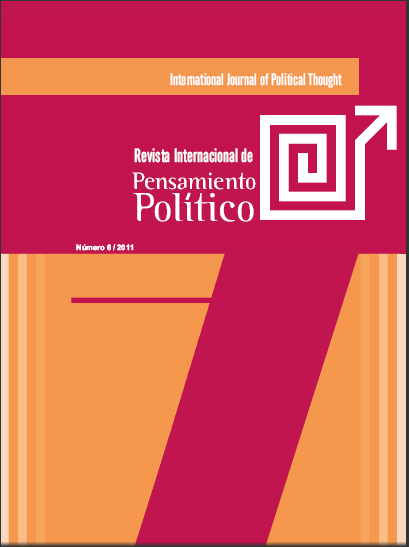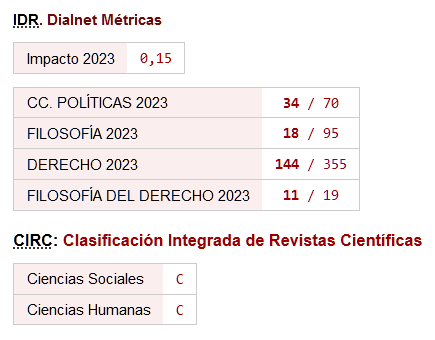Elementos para una economía política del republicanismo: un análisis crítico de la renta básica de Alaska
DOI:
https://doi.org/10.46661/revintpensampolit.1868Palabras clave:
control democrático, renta básica, concentraciones de poder económico, , independencia socioeconómica, libertarianismo, republicanismoResumen
En este artículo presentamos las ideas básicas que subyacen a la teoría política republicana y establecemos una línea de demarcación entre la perspectiva republicana y el libertarianismo de izquierdas, el cual tiene en la renta básica de Alaska su plasmación institucional más natural e inmediata. A partir de ahí, abordamos tres conjuntos de problemas que presenta el modelo de Alaska: la falta de una base económica sustancial, la falta de frenos a la acumulación de poder económico privado y la falta de mecanismos de control democrático sobre los procesos de extracción, imposición tributaria y distribución de los recursos naturales. Así, para que el republicanismo pueda hacerlo suyo, el modelo de Alaska debe ser sometido a importantes enmiendas y modificaciones que tienen que ver tanto con su naturaleza intrínseca como con el contexto institucional en el que opera. De este modo, concluimos sosteniendo que, aun cuando el modelo de Alaska puede ser compatible con la perspectiva republicana en un sentido débil, los republicanos deben proceder con cautela a la hora de defender el modelo en un sentido fuerte.Descargas
Citas
Ackerman B. y Alstott, A. (1999): The Stakeholder Society, New Haven: Yale University Press.
Arneson, R. (1995): «Against ‘Complex’ Equality», en D. Miller y M. Walzer (eds.), Pluralism, Justice, and Equality, Oxford: Oxford University Press. DOI: https://doi.org/10.1093/0198280084.003.0011
Arneson, R. (2010): «Self-Ownership and World Ownership: Against LeftLibertarianism», Social Philosophy & Policy, 27(1), pp. 168-194. DOI: https://doi.org/10.1017/S0265052509990070
Barry, B. (1995): «Spherical Justice and Global Injustice», en D. Miller y M. Walzer (eds.), Pluralism, Justice, and Equality, Oxford: Oxford University Press. DOI: https://doi.org/10.1093/0198280084.003.0004
Barry, B. (2005): Why Social Justice Matters, Cambridge: Polity Press.
Beard, C.A. y Beard, M.R. (1939): America in Midpassage, Nueva York: Macmillan.
Birnbaum, S. y Casassas, D. (2008): «Social Republicanism and Basic Income», en D. Leighton y S. White (eds.), Building a Citizen Society: The Emerging Politics of Republican Democracy, Londres: Lawrence & Wishart.
Bollier, D. (2006): «Using Stakeholder Trusts to Reclaim Common Assets», en W. Paxton y S. White (eds.), The Citizen’s Stake: Exploring the Future of Universal Asset Policies, Bristol: Policy Press. DOI: https://doi.org/10.46692/9781847421463.004
Carter, I. (2012): «Left-libertarianism and the Resource Dividend», en K. Widerquist y M.Howard (eds.), Alaska’s Permanent Fund Dividend: Examining its Suitability as a Model, Basingstoke: Palgrave. DOI: https://doi.org/10.1057/9781137015020_9
Carter, I., Kramer, M. y Steiner, H. (eds.) (2007): Freedom: A Philosophical Anthology, Oxford: Blackwell.
Casassas, D. (2007): «Basic Income and the Republican Ideal: Rethinking Material Independence in Contemporary Societies», Basic Income Studies, 2(2), pp. 1-7. DOI: https://doi.org/10.2202/1932-0183.1081
Casassas, D. (2010): La ciudad en llamas. La vigencia del republicanismo comercial de Adam Smith, Barcelona: Montesinos.
Cohen, G.A. (1995): Self-Ownership, Freedom, and Equality, Cambridge: Cambridge University Press. DOI: https://doi.org/10.1017/CBO9780511521270
Daniels, N. (1989): «Equal Liberty and Unequal Worth of Liberty», en N. Daniels (ed.), Reading Rawls, Stanford: Stanford University Press.
Domènech, A. y Raventós, D. (2007): «Property and Republican Freedom: An Institutional Approach to Basic Income», Basic Income Studies, 2(2), pp. 1-8. DOI: https://doi.org/10.2202/1932-0183.1090
Dowding, K., De Wispelaere, J. y White, S. (2003): «Stakeholding. A New Paradigm in Social Policy», en K. Dowding, J. De Wispelaere y S. White (eds.), The Ethics of Stakeholding, Basingstoke: Palgrave. DOI: https://doi.org/10.1057/9780230522916
Esping-Andersen, G. (1990): The Three Worlds of Welfare Capitalism, Cambridge: Polity Press. DOI: https://doi.org/10.1177/095892879100100108
Fama, E.F. y M.C. Jensen (1983): «Separation of Ownership and Control», Journal of Law and Economics, 26, pp. 301-325. DOI: https://doi.org/10.1086/467037
Frank, R. y Cook, P.J. (1995): The Winner-Take-All Society. Why the Few at the Top Get So Much More Than the Rest of Us, New York: Free Press.
Freeman, S. (2001): «Illiberal Libertarians: Why Libertarianism Is Not a Liberal View», Philosophy & Public Affairs, 30(2), pp. 105–151. DOI: https://doi.org/10.1111/j.1088-4963.2001.00105.x
Goldsmith, S. (2005): «The Alaska Permanent Fund: An Experiment in Wealth Distribution», en G. Standing (ed.), Promoting Income Security as a Right. Europe and North America, Londres: Anthem Press.
Goldsmith, S. (2012): «The Economic and Social Impacts of the Permanent Fund Dividend on Alaska», en K. Widerquist y M. Howard (eds.), Alaska’s Permanent Fund Dividend: Examining its Suitability as a Model, Basingstoke: Palgrave. DOI: https://doi.org/10.1057/9781137015020_4
Goodhart, M. (2007): «None So Poor that He is Compelled to Sell Himself: Democracy, Subsistence and Basic Income», en S. Hertel y L. Minkler (eds.), Economic Rights: Conceptual, Measurement and Policy Issues, Cambridge: Cambridge University Press. DOI: https://doi.org/10.1017/CBO9780511511257.005
Grey, T . (1980): «The Disintegration of Property», en J.R. Pennock y J.W. Chapman (eds.), NOMOS XXII: Property, Nueva York: New York University Press.
Griffin, C. (2012): «Stakeholding Through the Permanent Fund Dividend: Fitting Practice to Theory», en K. Widerquist y M. Howard (eds.), Alaska’s Permanent Fund Dividend: Examining its Suitability as a Model, Basingstoke: Palgrave. DOI: https://doi.org/10.1057/9781137015020_11
Haagh, L. (2011): «Basic Income, Social Democracy and Control over Time», Policy & Politics, 39(1), pp. 43-66. DOI: https://doi.org/10.1332/030557311X546316
Harrington, J. (1992) [1656]: The Commonwealth of Oceana and A System of Politics, ed. a cargo de J.G.A. Pocock, Nueva York: Cambridge University Press. DOI: https://doi.org/10.1017/CBO9781139137126
Howard, M. (2012): «A Cap on Carbon and a Basic Income: A Defensible Combination in the U.S.?», en K. Widerquist y M. Howard (eds.), Alaska’s Permanent Fund Dividend: Examining its Suitability as a Model, Basingstoke: Palgrave.
Meade, J (1964): Efficiency, Equality and the Ownership of Property, Londres: Allen Unwin.
Murray, C. (2006): In Our Hands: A Plan to Replace the Welfare State, Washington D.C.: AEI Press.
Nozick, R. (1974): Anarchy, State, and Utopia, Oxford: Blackwell.
Otsuka, M. (2003): Libertarianism Without Inequality, Oxford: Oxford University Press. DOI: https://doi.org/10.1093/0199243956.001.0001
Paine, T. (1997) [1797]: «Agrarian Justice», en B. Kuklick (ed.), Thomas Paine: Political Writings, Cambridge: Cambridge University Press.
Pettit, P. (1993): The Common Mind: An Essay on Psychology, Society and Politics, Nueva York: Oxford Univ. Press.
Pettit, P. (1997): Republicanism: A Theory of Freedom and Government, Nueva York: Oxford University Press.
Pettit, P. (1999): «Republican Freedom and Contestatory Democratization», en
I. Shapiro y C.Hacker-Cordón (eds.), Democracy’s Value, Cambridge: Cambridge University Press.
Pettit, P. (2000): «Democracy, Electoral and Contestatory», Nomos, 42, pp. 105-44. DOI: https://doi.org/10.18574/nyu/9780814786628.003.0009
Pettit, P. (2001): A Theory of Freedom: From the Psychology to the Politics of Agency, Oxford: Oxford University Press.
Pettit, P. (2003): «Agency-freedom and Option-freedom», Journal of Theoretical Politics, 15(4), pp. 387-403. DOI: https://doi.org/10.1177/0951692803154003
Pettit, P. (2006): «Freedom in the Market», Politics, Philosophy and Economics, 5(2), pp. 131-149. DOI: https://doi.org/10.1177/1470594X06064218
Pettit, P. (2008): «Three Conceptions of Democratic Control», Constellations, 15(1), pp. 46-55. DOI: https://doi.org/10.1111/j.1467-8675.2008.00473.x
Pettit, P. (2009): «Varieties of Public Representation», en I. Shapiro et al. (eds.), Political Representation, Cambridge: Cambridge University Press. DOI: https://doi.org/10.1017/CBO9780511813146.005
Raventós, D. (2007): Basic Income: The Material Conditions of Freedom, Londres: Pluto Press.
Raventós, D. y Casassas, D. (2004): «La Renta Básica y el poder de negociación de ‘los que viven con permiso de otros’», Revista Internacional de Sociología, 34. DOI: https://doi.org/10.3989/ris.2003.i34.291
Rawls, J. (1993): Political Liberalism, Nueva York: Columbia University Press.
Rawls, J. (1999) [1971]: A Theory of Justice (edición revisada), Cambridge, MA: Harvard University Press.
Rousseau, J.J. (2010) [1754]: Discurso sobre el origen y los fundamentos de la desigualdad entre los hombres y otros escritos, Madrid: Tecnos.
Skinner, Q. (1992): «On Justice, the Common Good, and the Priority of Liberty», en C. Mouffe (ed.), Dimensions of Radical Democracy. Pluralism, Citizenship, Community, Londres/N. York: Verso.
Skinner, Q. (1998): Liberty before Liberalism, Cambridge: Cambridge University Press. DOI: https://doi.org/10.1017/CBO9781139171274
Sunstein, C. (1993): After the Rights Revolution: Reconceiving the Regulatory State, Cambridge, MA: Harvard University Press.
Vallentyne, P. (2003): «Self-Ownership and Equality: Brute Luck, Gifts, Universal Dominance and Leximin», en A. Reeve y A. Williams (eds.), Real Libertarianism Assessed, Basingstoke: Palgrave.
Vanderborght, Y. y Van Parijs, P. (2005) : L’allocation universelle, París: La Découverte. DOI: https://doi.org/10.3917/dec.vande.2005.01
Van Donselaar, G. (2008): The Right to Exploit, Nueva York: Oxford University Press. DOI: https://doi.org/10.1093/acprof:oso/9780195140392.001.0001
Van Parijs, P. (1995): Real Freedom for All: What (if anything) Can Justify Capitalism?, Oxford: Oxford University Press.
Waldron, J. (1988): The Right to Private Property, Oxford: Clarendon Press.
Walzer, M. (1983): Spheres of Justice, Nueva York: Basic Books.
White, S. (2011): «Basic Income versus Basic Capital: Can We Resolve the Disagreement?»,Policy and Politics, 39 (1), pp. 67-81. DOI: https://doi.org/10.1332/030557311X546325
Widerquist, K. (2012): «Citizens Capital Accounts», en K. Widerquist y M. Howard (eds.), Alaska’s Permanent Fund Dividend: Examining its Suitability as a Model, Basingstoke: Palgrave.
Widerquist, K. y Howard, M. (eds.) (2012a): Alaska’s Permanent Fund Dividend: Examining its Suitability as a Model, Basingstoke: Palgrave.
Widerquist, K. y Howard, M. (2012b): «Introduction: Success in Alaska», en K. Widerquist y M. Howard (eds.), Alaska’s Permanent Fund Dividend: Examining its Suitability as a Model, Basingstoke: Palgrave. DOI: https://doi.org/10.1057/9781137015020
Winter, S. (2012): «Climate Change, Complicity, and Compensation», en K. Widerquist y M. Howard (eds.), Alaska’s Permanent Fund Dividend: Examining its Suitability as a Model, Basingstoke: Palgrave. DOI: https://doi.org/10.1057/9781137015020_13
Wolff, J. (1991): Robert Nozick: Property, Justice and the Minimal State, Cambridge: Polity Press.
Wright, E.O. (2006): «Basic Income as a Socialist Project», Basic Income Studies, 1(1), pp. 1-11. DOI: https://doi.org/10.2202/1932-0183.1008
Descargas
Publicado
Cómo citar
Número
Sección
Licencia
Derechos de autor 2016 Revista Internacional de Pensamiento Político

Esta obra está bajo una licencia internacional Creative Commons Atribución-NoComercial-CompartirIgual 4.0.
Política de acceso abierto
Se permite el acceso libre y abierto de cualquier interesado a todos los contenidos de los números de la revista, sin costo alguno, pudiendo imprimir y trasladar todos los artículos, con la única condición de precisar la fuente y la autoría.
La revista: a) no cobra a las autorías costes por el procesamiento de los artículos ni por el envío de los mismos, b) mantiene el copyright para los autores sin restricciones, c) facilita a los autores conservar sus derechos de publicación sin limitaciones.
La Revista Internacional de Pensamiento Político es una obra original del Laboratorio de Ideas y Prácticas Políticas de la Universidad Pablo de Olavide. Todos los artículos incluidos en la Revista son obra original de sus respectivas autorías. Esta Revista se ofrece libremente a la comunidad científica y académica sin coste alguno y libera los contenidos de acuerdo a la licencia "Reconocimiento-NoComercial-CompartirIgual 4.0 CC BY-NC-SA" del proyecto Creative Commons dispuesta en la siguiente url: https://creativecommons.org/licenses/by-nc-sa/4.0/legalcode
Si deseas traducir o compilar alguno de los artículos aquí disponibles, por favor, ponte en contacto













